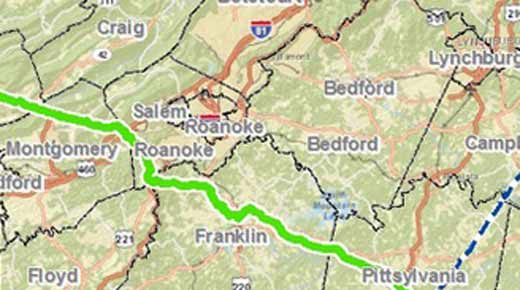 The proposal to build a 300-mile long 42” natural gas pipeline that would traverse through the Bent Mountain area of Southwest Roanoke County has many residents up in arms – including, at least for now, the Board of Supervisors, which voted 4-1 last week for a resolution against it.
The proposal to build a 300-mile long 42” natural gas pipeline that would traverse through the Bent Mountain area of Southwest Roanoke County has many residents up in arms – including, at least for now, the Board of Supervisors, which voted 4-1 last week for a resolution against it.
Supervisors cited concerns about possible damage to the county water supply should there be a leak or explosion, and the fact that they seemed to find out about the Mountain Valley Pipeline proposal after everyone else did – like Bent Mountain residents and the media.
Only Hollins supervisor Al Bedrosian did not support the resolution against the pipeline, saying he didn’t have a problem with a private energy company making money. Bedrosian did say, however, that if there were possible issues with water contamination or if eminent domain had to be used because certain landowners did not want to sell rights of way – pretty much a certainty – than he would not support the project.
In fact, there isn’t any jurisdiction that Roanoke County may have over the pipeline, since it is regulated as a utility by the Federal Energy Regulatory Commission (FERC), which can use eminent domain to take easements through private property if it so chooses. Bent Mountain residents have started an organization called Pipeline Pushback and invited legal experts to a meeting last week to discuss options.
Virginia strengthened its eminent domain law to prevent private entities from being able use it, even if tax revenue that would result is for the public good. That came following the controversial and widely reviled Kelo U.S. Supreme Court decision that upheld the right of a private company to evict people from their properties for a development that would produce tax revenue. However, since FERC is a federal entity the Virginia law against using eminent domain except for public projects – roads, bridges, etc. – may not apply to the pipeline.
Mountain Valley Pipeline, a joint project of EQT and NextEra, also released a commissioned economic report last week, claiming that building the pipeline through Roanoke and Franklin Counties, and other localities, would create thousands of jobs and net Roanoke County about 1.6 million dollars in property taxes annually if and when it is built. (Mountain Valley’s own timeline shows a December 2016 start for the venture, which would deliver natural gas from drillings in the upper Midwest.)
The Blue Ridge Land Conservancy board of directors has released a statement opposing the Mountain Valley Pipeline project as it now stands, where it might go through national forests, the Blue Ridge Parkway and across tracts with conservation easements placed on them.
The first executive director for the organization, when it was the Western Virginia Land Trust – Rupert Cutler – is now the board chairman. Hold the phone says Cutler – there are environmental impact studies to be completed and questions to clear up about issues with Mountain Valley pipeline projects in Pennsylvania, West Virginia and elsewhere (contaminated water supplies and pipeline explosions said Cutler.)
“We thought that was appropriate for a land conservation group to support the protection of wilderness areas,” said Cutler, who is also connected with the Cabell Brand Center.
As part of that organization Cutler is planning to conduct a public forum on pipelines at Virginia Western Community College next March 9 – similar to the one he held several years back on the dangers of uranium mining in Virginia. Cutler wants the March event to be “an objective, balanced series of presentations on natural gas pipelines – their pros and cons.”
The former Roanoke City Councilman does see the other side of the coin however – the need for localities to consider new sources of revenue like the real estate property tax dollars suggested.
Cutler adds, however, that the annual $1.6 million figure quoted for Roanoke County may be misleading – if assessed property values decline because they are less attractive with pipelines (and 75 feet right-of-ways) then the taxes collected from landowners may decline. “It might be a wash in that regard,” said Cutler.
Public meetings were held earlier this week in Rocky Mount and Salem; no doubt Mountain Valley Pipeline officials got an earful from some residents who want no part of a 42” underground line filled with natural gas running underneath their land. With construction two years away at the very least there is plenty of time for debate ahead.
By Gene Marrano


